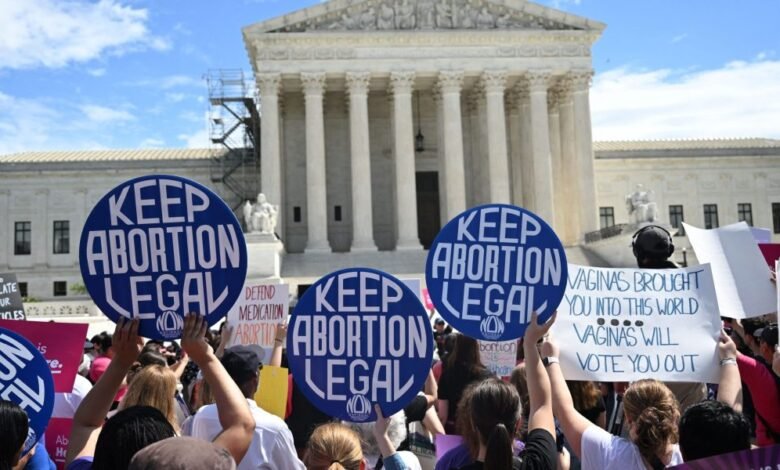How abortion travel benefits have so far survived Trump’s second term, and why they’re more necessary than ever

When the Supreme Court’s Dobbs decision overturned Roe v. Wade three years ago, and abortion rights laws once again became state-level concerns, corporate America stepped up.
Dobbs triggered bans in several states led by Republican lawmakers who oppose abortion. But companies with employees scattered across the country decided that workers in Texas or Arkansas, where abortion bans immediately took hold, deserved access to the same health care options as their peers in New York or Oregon. As such, Google, Citi, Levi’s, Netflix, Apple, and others created benefits or expanded existing perks so that if an employee needed to travel out of state for an abortion, some or all of the costs of expenses like transportation, fuel, lodging, meals, and child care would be covered.
Many corporate leaders were discreet about their new policies, sharing them internally and barely acknowledging their existence when the press made inquiries. In some sense, the benefits became political statements in themselves. But a few executives, like Meta’s COO Sheryl Sandberg, were more overt about supporting abortion access. Still others made public comments acknowledging tensions around the issue. “We recognize people feel passionately about this topic—and that there are teammates and athletes who will not agree with this decision,” Dick’s Sporting Goods said in a memo about a $4,000 stipend it created for this cause.
Today, somewhat surprisingly, abortion travel benefits are said to be a mainstay at large employers. It’s not surprising, however, that companies seem even less eager to discuss them. Among 20 companies that, in 2022, confirmed their commitments to covering the costs of travel for abortion, Fortune found that five—Citi, JPMorgan, HPE, Levi’s, Yelp—still have those benefits in place, often as part of an umbrella policy for other types of health care or procedure that’s not available in an employee’s home state.
While many companies acknowledge that the benefit was initially created in response to the loss of reproductive health care access in 2022, they often emphasized that the benefit was later expanded. In a few statements sent to Fortune, all the companies would say about the benefits is some variation on, “We believe our employees should have consistent healthcare coverage, regardless of where they live.”
Apple, Bumble, Comcast, Dick’s Sporting Goods, Disney, Google, Match, Meta, Netflix, Salesforce, and Tesla did not respond to requests for comment. Amazon, Bank of America, and Starbucks declined to comment.
The silence shouldn’t be misinterpreted as a sign that benefits have fallen out of favor, according to Ben Conley, an attorney at Seyfarth Shaw who was hired by several top companies to set up the travel coverage in 2022. He says he hasn’t seen any data or trend to suggest that employers are revoking the benefit. Amy Spurling, CEO and founder of Compt, an HR benefits platform, similarly says she has seen steady interest in these plans among employers for whom abortion bans are relevant. “You can do very broad-based, 100% personalized health benefits,” she said, “It’s not tied to insurance. It allows employees to go and get the care they need if they don’t have access to it.”
But with Donald Trump’s win last fall, the number of companies willing to publicly champion causes deemed progressive or “woke,” including reproductive rights and the importance of diversity, equity, and inclusion in the workplace, has dwindled. Against this backdrop, abortion travel benefits have not only survived, they have become even more critical, especially as the White House mounts fresh political attacks on Planned Parenthood, the largest provider of abortion in the U.S.
Companies have also recently discovered that because they designed the abortion travel benefit to extend beyond one procedure, as a way to provide political cover, they may already have a solution for employees who need to travel for other types of health care that may one day be in peril, like fertility benefits, a topic dividing Republican voters.
Still, the need to tread lightly, or at least be aware of the risks to touting the benefits, remains, says Conley. Companies are left trying to thread the needle between serving employees and protecting their businesses.
Corporate activism
The Dobbs decision, a seismic event in the history of abortion rights, followed a steady drip of changes that slowly severed access to reproductive rights for millions of Americans. Most notably, in 2021, the Supreme Court declined to block a bill that became known as the Texas Heartbeat Act, which banned abortions when a fetal heartbeat was detectable, at about six weeks into pregnancy. That draconian law compelled a few corporate leaders to take to the virtual town square. Yelp, for example, lobbied against the ban. Salesforce offered to help cover the costs of relocating for employees in Texas who wanted to leave that state. “Ohana,” Marc Benioff, Salesforce CEO, said in a tweet, using the Hawaiian word for family to refer to the company employees, “if you want to move we’ll help you exit TX. Your choice.”
One year later, as Roe v. Wade appeared to be in jeopardy, there was a “flurry” of activity among employers, says Conley. It was still an era when CEOs were expected to respond to employee demands for statements on controversial laws and social causes, which explained some of the corporate response. Conley believes most corporations sought to make their benefit offerings equitable across their workforce, without allowing geography to disadvantage some.
Companies amended insurance policies to add travel costs as part of a medical reimbursement benefit, while others created stipends that could be accessed separately from insurance schemes. Among those that fell into the second category, many large companies relied on a self-certifying system, saying they trusted employees to use the coverage of up to, for example, $2,000, for its stated purpose. “Some of the employers who had gone that route—we trust you to use this appropriately—were seeing a surprising amount of fraud in their employee population, where people were just using this as a vacation slush fund,” Conley notes. Such fraud was rare, he adds, but it was enough to push HR departments to adopt better oversight provisions, such as using a third-party to help validate claims or setting a cap on stipend reimbursements. Eventually, the template for the benefit became more standardized, making it less necessary for companies to engage attorneys.
In the fall of 2022, one survey of large employers (those with more than 500 employees) found that 44% said they had a travel benefit that would cover employees seeking out-of-state abortions, and 56% of companies with more than 5,000 employees said the same.
That the benefits would stick was never guaranteed, especially once states began criminalizing acts seen as aiding and abetting abortion. Texas State Rep. Briscoe Cain threatened to prosecute Citigroup for creating a travel costs benefit in response to changes in abortion laws, for example. America First Legal, the conservative activist group founded by Trump ally Stephen Miller, asked the EEOC to open an investigation into Dick’s Sporting Goods because of its $4,000 stipends for abortion-related travel costs. The AFL claimed that the move was a Title VII violation because it almost exclusively benefited women. “There was material concern that boards of directors were going to be hauled into court,” says Conley, but that hasn’t happened. In terms of corporate litigation or charges, “we have seen zero enforcement action,” he says.
The popularity of the benefit among workers is impossible to gauge. Tens of thousands of American women have traveled for abortions since 2022, according to data from the Guttmacher Institute, a pro-abortion rights advocacy group. It found an estimated 155,000 people crossed state lines to access abortion last year, and 170,000 people did the same the year before. However, the number of people who have turned in bills for hotel stays or gas receipts connected to an out-of-state abortion is unknown, often by design. “I don’t want to know. I don’t want to track that,” says Spurling.
“I don’t want to create a paper trail for people to get sued. I don’t want to create a paper trail for companies to be subject to [investigations] by local governments,” she explains, “so we deliberately do not have that type of information.”
But Conley believes employers have likely received a minuscule number of claims, not for lack of trying to make the reimbursement process straightforward and free of privacy concerns. Navigating the health system and insurance can be complex, he says, and submitting receipts and tracking expenses can be a hassle for any type of benefit. The benefit can be “life-changing” for the person who does use it, he said. But consider state laws targeting women seeking abortions, and anyone who helps them, and most people are going to be reluctant to discuss their travel plans with anyone, let alone hand in receipts to their employer.
That’s also part of the reason the benefit has survived. “There’s some thinking in the business community that if your goal is to restrict access to abortions, this is a less logical angle to do so,” the lawyer says. Anti-abortion activists can have a larger impact through other means.
A ‘back-door’ ban
Indeed, part of the president’s “big beautiful bill” that was just passed into law could have been a far more effective tool for advancing the anti-abortion agenda, even in states where it remains legal. The bill included a one-year ban on Medicaid reimbursements for health care non-profits that perform abortions and receive more than $800,000 per year in federal funding. The provision is so specific that it has been read as an attempt to defund Planned Parenthood, which relies on Medicaid to provide millions with a range of care, including cancer screenings, birth control prescriptions, and wellness exams. (Medicaid does not cover the majority of abortions.)
In an interview with PBS, Alexis McGill Johnson, president of the Planned Parenthood Action Fund, said she saw the move as a back-door abortion ban, since a funding loss of that size would force closures of Planned Parenthood clinics across the U.S. However, as of July 28, Planned Parenthood was safe: a judge indefinitely blocked Trump’s provision, seeing it as retribution.
Planned Parenthood did not respond to a request for comment.
“It’s just access to care for women in general is going away,” says Compt’s Spurling, referring not only to the Planned Parenthood crisis but obstacles to finding gynecological care across large swaths of the U.S. With the anti-abortion movement now pushing against Trump’s support for IVF, she says she has seen a surge of interest in benefits that could protect access to fertility treatments should they, too, become unlawful in some regions.
“The vast majority of employers who implemented these types of programs back in 2022 did so in a manner such that they don’t feel intense public pressure or scrutiny right now,” Conley, the employment lawyer, says. His advice for companies that have yet to adopt the benefit hasn’t changed: First, establish why you’re adding the benefit, a question that will drive its design, what you call it, and how you communicate about it and roll it out. “If the reason that you’re doing it is to meaningfully provide access to a service, there’s not a need to publicly announce ‘This is a new benefit’,” he says, and there are some potential legal risks to doing so.
Spurling shares similar advice for being sensible and stealthy about the benefit and how it’s framed for employees. “Be very pointed on ‘If you can’t get access to care and you’ve got to travel, that’s what this is for,’” she says, “versus saying, ‘Hey, this is for you to go to another state and get an abortion.’”
To be sure, some HR experts fear that companies may still face investigations over these benefits from the U.S. Equal Employment Opportunity Commission (EEOC), even if they’ve designed the benefit to cover a range of procedures.
Andrea Lucas, acting chair of the EEOC, may soon be joined by Brittany Bull Panuccio, assistant U.S. attorney in Florida and Trump’s pick to fill one of the empty seats on the commission. If Panuccio is confirmed, the commission will have the quorum needed to enact Trump’s policies around issues like DEI. And Lucas has already indicated that, like America First Legal, she thinks offering abortion travel benefits discriminates against men. It’s possible, some say, that she’ll invite employers to act like whistleblowers about broad, gender-neutral medical travel benefits that are in practice being used almost exclusively by women seeking abortions.
For now, companies that want to protect the benefits need to remain vigilant.
2025-07-30 14:02:00




